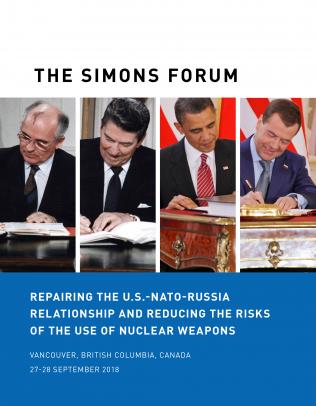Report of the Simons Forum on Repairing the U.S.-NATO-Russia Relationship and Reducing the Risks of the Use of Nuclear Weapons

The 2018 Conference and Forum on Repairing the U.S.-NATO-Russia Relationship and Reducing the Risks of the Use of Nuclear Weapons, was convened by The Simons Foundation Canada and Simon Fraser University’s Morris J. Wosk Centre for Dialogue, under the auspices of the Simons Distinguished Visiting Fellow in International Law and Human Security at Simon Fraser University in Vancouver, Canada.
The Forum was held at Simon Fraser University (SFU) on September 27 and 28, 2018 and was preceded by an Opening Statement by Dr. Bruce G. Blair, the 2018 SFU Simons Distinguished Visiting Fellow in International Law and Human Security, and a Public Dialogue the evening of September 26, attended by over 150 people and facilitated by Shauna Sylvester, from the SFU Morris J. Wosk Centre for Dialogue.
Bruce Blair, Research Scholar in Princeton University’s Program on Science and Global Security and Co-founder of Global Zero, chaired the Forum that brought together 28 former military, arms control negotiators, scholars, NGOs and government officials from Russia, the U.S., NATO and Canada.
The Conference Framework Statement identified the aim of the 2018 Simons Forum to evaluate the current situation and develop concrete steps to advance engagement and security among the key actors. It examined:
- the deterioration of U.S.-Russia and NATO Russia relations since the end of the Cold War;
- the risks and dangers of current tensions escalating to the level of nuclear confrontation;
- the role and impact of applicable treaties and agreements and impact on strategic and crisis stability;
- steps needed to restore trust, confidence and security cooperation, reduce the risks of escalation, and surmount the geopolitical and domestic political obstacles; and
- the roles of NATO countries in addition to the U.S., particularly Canada and civil society organizations and academics to help find common ground among the key actors.
The desire was to go beyond the current hand wringing that dominates the discourse, expand understanding of how the current situation developed and identify specific steps that could be taken to increase stability and engagement between the U.S., NATO and Russia.
The Forum was organized in a series of Panels with diverse leaders and discussants from Russia, the U.S. and NATO on each one. The Forum operated under The Chatham House Rule, so this report does not attribute statements to individuals unless they have explicitly given their permission to do so. Some contributed papers are incorporated into the text with the authors’ permission. A list of participants is included in Appendix A with their permission.
Although this report is intended to provide readers with a summary of the discussions, it is also intended to serve an educational purpose for those who are less familiar with the subject of nuclear security – a briefing book of sorts, for officials, staff, students or journalists. Thus, it includes an introduction to the historical context of current events on page 12 and treaties and a compendium of acronyms on page 68. Those readers already familiar with the background are encouraged to go directly to the Overview of Strategic and Crisis Stability on page 20.
A Conference Report has been published to summarize its proceedings and is now available online from Simon Fraser University and from The Simons Foundation at the link below. To request a complimentary hard copy version of the report, please contact ehynes@thesimonsfoundation.ca.